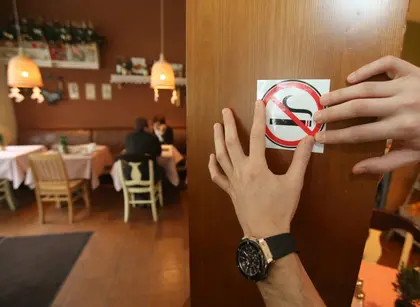The early anecdotal
results are encouraging.
Not only are smokers largely obeying the
law and going outside to smoke, despite sub-freezing temperatures, employees of these places are happy about the
healthier working conditions and eager to enforce the ban. These workers, after all, are the ones who suffer the most exposure to dangerous secondhand smoke.
JOIN US ON TELEGRAM
Follow our coverage of the war on the @Kyivpost_official.
“Now we have one of the
most progressive laws to preventing smoking,” said Yuriy
Miroshnychenko, lawmaker in the pro-presidential Party of Regions.
“From now one, even lawmakers will have go outside the parliament
if they want to smoke.”
Previously, restaurants
divided smoking and non-smoking customers into sections, an
ineffective remedy since hazardous smoke spreads throughout an
establishment.
Tetyana Khrystenko,
manager of the popular Golden Gate pub in downtown Kyiv, welcomes the
law and does not expect a drop in business since the ban applies to
all other competitors.
The bar’s waiters and
bartenders also welcome the change. “I welcome it as a
non-smoker and I already feel positive changes, because I do not have
to breathe the smoke,” said waitress Olena Ukrainska.
The same was true in the
normally crowded TGI Friday’s restaurant across the street from
Bessarabska Market in downtown Kyiv.
Katya Troschyna, a hostess, was all smiles when asked
about the ban – the same reaction as her colleagues.
Troschyna, who is studying to be a translator at
Kyiv National Linguistic University, is a smoker. But she doesn’t
mind being forced to duck outside in the dead of winter to get
her nicotine fix.
“I work in here 10 hours a day and it was
hard to even breathe. It was too much smoke – even for me,”
Troschyna said of working conditions before the ban.
“Everything – my T-shirt, pants, hair – was filled with smoke.”
Troschyna admitted that “smokers are mostly against
the ban. It’s very inconvenient for them to step outside when
they’re having a drink.”
But so far, she said, compliance has been 100 percent.
The restaurant has put up no-smoking signs, taken away the ashtrays
and no longer greets customers with the familiar question: “Would
you like to sit in the smoking or non-smoking section?”
Troschyna thinks people will quickly become
accustomed to the new situation. And TGI Friday’s already smells
better to regular customers. “There’s no reason to complain. Everybody’s
doing it. It’s the law,” Troschyna said.
She’s trying to quit smoking and the ban might help
her cut down, but it’s hard. “I tried to quit many times,”
Troschyna said. “But when you are working, smoking is kind of like
a rest. It’s relaxing.”
The indoor smoking ban was
passed to meet Ukraine’s obligations under the World Health
Organization’s Framework Convention on Tobacco Control, which the
nation ratified in 2006.
Among other public health
steps, aside from the indoor smoking ban, the international agreement calls on nations to ban tobacco
advertising, raise tobacco taxes, impose health warnings on cigarette
packs and conduct education campaigns.
Ukraine has made progress in all these areas in the last five years.
Lawmakers have increased cigarette
taxes several times, although Ukraine still has among the cheapest
cigarettes in Europe, fueling illicit smuggling abroad. The nation
now requires cigarette packs to have 50 percent of the front covered with text health warnings and 50 percent of the back with graphic
health warnings. All forms of advertising are banned under law.
Miroshnychenko, President
Viktor Yanukovych’s representative in the Verkhovna Rada, noted that
Ukraine – despite these steps – remains one of the heaviest
smoking nations in the world. Some 29 percent of adults – or 11
million Ukrainians – are estimated to be regular smokers.
The indoor smoking ban,
adopted by a strong majority in the 450-seat parliament, should help. State buildings are also covered
by the ban, besides restaurants, cafes and nightclubs. Customers
at outdoor summer terraces and cafes can still smoke. Also,
smoking is now banned in underpasses and even outdoors at bus
stops, sports facilities, hospitals, educational institutions and
playgrounds. Moreover, smoking areas in hotels and dormitories cannot
exceed 10 percent of the entire premises.
Ukraine’s parliament has
for years had two small rooms for smoking plus a men’s toilet where
smoking took place. All that is now banned. But the public will
eagerly watch whether lawmakers, known for flouting their legal
immunity from prosecution, are forced to comply with the law. The
first enforcement test comes on Dec. 18.
Violations can be punished
by hefty fines up to Hr 10,000 ($1,250) for establishment owners.
Individual smokers can be fined up to Hr 175 ($21). Bars or
restaurants can be even be fined for making ashtrays available.
According to a poll by
Kyiv International Institute of Sociology, most Ukrainians –
including – smokers support the ban.
“Full bans work better
than partial ones… both legally and medically,” said Taras
Shevchenko, head of the Kyiv-based Institute of Media Law. Shevchenko
expects the law to be easily enforced.
Olesya Orobets, an
opposition lawmaker, encourages everyone to take part in enforcing
the legislation by complaining about smokers to restaurant and other
managers.
Hanna Hopko, coordinator
of the Coalition for a Smoke-Free Ukraine, said the group
will monitor how the new law is enforced.
Former Ukrainian Health
Minister Mykola Polishchuk said progress is being made in curbing the
deadly addiction that prematurely kills 100,000 Ukrainians each year. Polishchuk said that, in recent
years, tobacco-related diseases in Ukraine have declined as stronger
public health messages took hold
and the number of smokers decreased.
“No one is violating
smokers’ rights,” Polishshuk said. “It’s the other way around, we
are creating conditions to preserve their health.”
Kyiv Post staff writer
Yuriy Onyshkiv can be reached at [email protected]. Kyiv Post chief editor Brian Bonner contributed to this story.
You can also highlight the text and press Ctrl + Enter




